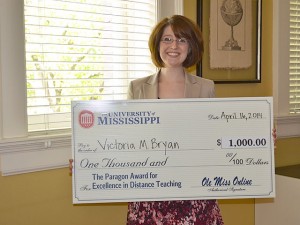OXFORD, Miss. – University of Mississippi students in Victoria Bryan’s online Writing 250: Advanced Composition course may wear their pajamas to class, but that doesn’t stop them from engaging in thoughtful and insightful group discussions with their classmates and instructor.
“My students come from all walks of life,” Bryan said. “I enjoy the flexibility that online learning offers traditional and nontraditional college students. I’m only 28, and the college experience today already looks much different than mine did. Students work, have families, own businesses, and engage in many other obligations outside of their academic responsibilities.
“As technology has changed and advanced our world, it’s also changed and advanced educational opportunities. Because of online and distance learning, the University of Mississippi can serve students who would not have been able to carve out time for an undergraduate degree 10 years ago.”
Bryan has been awarded the 2014 Paragon Award for Excellence in Distance Teaching. The purpose of the annual award is to recognize UM faculty members who use online learning technology effectively through good practices in course design, show an innovative use of technologies that transcend traditional classroom instruction and excel in their commitment of providing a quality education to students. The award includes a $1,000 prize.
“I found that online instruction fits my teaching style well,” Bryan said. “I like to engage students in flexible formats. For example, we may discuss papers as a group online in Google Hangout, and I find that those students who participate in these group sessions are increasingly grasping the material and excelling on their assignments.”
Bryan also finds innovative ways to stay in touch with technologically inclined students. Instead of emailing reminders about tests and coursework deadlines, she uploads a YouTube video of herself explaining the upcoming assignments.
“Online courses serve students and instructors best when they are designed for consistency and ease of navigation,” Bryan remarked. “My course is fairly minimalistic. Too many links, windows, etc., clutter the screen and can cause students to shut down. I separate the course into units and within those units I provide a consistent structure.”
Bryan also requires students to meet with her via Skype at the beginning of the semester to discuss the course and her expectations for class participants.
“While this gets time-consuming, I have found that the best practice for online instruction is to put the time in up front,” she said. “That significant time investment during the first two weeks of the semester frees up more time for me to work on my own research, future course development, conference travel, and other obligations academics face in any given semester.”
Bob Cummings, director of the university’s Center for Writing and Rhetoric, said he is especially proud of the work Bryan put into online writing course.
“Not a lot of people in our field can teach writing and literature both in person and online well,” Cummings said. “It is pretty special that Victoria can do both so successfully. She does a great job making this course interactive and productive.”
Bryan, a fourth-year doctoral candidate in English, is working on her dissertation entitled “Modern(izing) Burial in Interwar American Fiction.” Besides her research and service, she has been teaching for six years. Those years include live and online instruction in English and humanities fields.
She has also worked with incarcerated learners, teaching literature and composition at Charles Bass Correctional Complex in Nashville.
“I feel lucky to be a part of the University of Mississippi’s efforts to make online instruction as challenging and rewarding as on-ground classes are, ensuring that students who earn credits online aren’t assumed to have taken the easy way out,” Bryan said.
